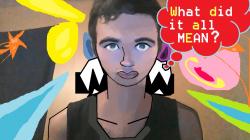Red Fox
Folder:
Tennessee Myth I am, ater all, a predator
A she-fox of little strength
But to the cicadas and squirrels
a red God of death
A lesser among my greaters
A greater among my lessers
But with sharp eyes
And beautiful fur
I am desired for my fur
Men enter my domain
who wish to wear me for a season
Draped around their neck
But I only desire the hunt
The gnashing of my teeth
Into chitinous shells
And red meat

With delicate and sumptuous
With delicate and sumptuous strokes of beauty, you opened a window into the life of a creature that is both feared and vulnerable: a "red god of death" and a victim of human heartlessness and vanity.
By showing us the contrast in this regal carnivore's experience (The desire for the hunt vs being the hunted) and expressing her nature through her own eyes, you brought her to life and made her unforgettable.
A deeply moving, expertly conceived and praiseworthy work of art.
Respect!!!
Please forgive a second
Please forgive a second comment posted so soon after the first one---on both this poem and the Siren poem---but I just had to tell you how impressive this one, and the other, are on a second reading. Like the best poems on this site, or anywhere else, these poems become more resonant, more impressive (and, given their subject matter, even more chilling) on the second read. And I am sure I will be reading them repeatedly---the same way I read Aickman's or Sarban's tales. When I was a child, of elementary school age, I was asked why I wanted to watch, repeatedly (although not televised as often as I wanted) the old Universal horror films of the thirties and forties, since, upon a first viewing, I knew the story and how it ended. And I realized, at that early age (one of the few learning experiences that I did not foul up), that the first viewing was to get the story; the second viewing, and all subsequent viewings, was to relish the artistry with which it was presented. Reading your poems about the siren and the fox, yesterday, I was struck by the same realization, which was proven again this afternoon. Although I now know how the "story" in each poem ends, I will continue to read them in order to enjoy the artistry of your presentation.
Starward*Led
I will begin by likening this
I will begin by likening this poem to my most favorite tale by Robert Aickman (who is acclaimed by many, including myself, to be the most brilliant writer of horrific tales in the twentieth century): Pages From A Young Girl's Journal (which is now online in a pdf format), in which he juxtaposed beauty and charm with a mounting sense of horror. You have done exactly that, but in a far briefer format. I also offer this compliment, which I mean with all the sincerity of which I am capable: had Aickman been a poet, he would have written poems like this one of yours.
I like the way you deploy the four stanzas into a kind of outer and inner balance: the first and last stanzas (which I call the outer) emphasize the speaker's predatory nature; the second and third, the inner, emphasize the speaker's beauty and attractiveness.
Back in 1991, when I completed my first reading of the Young Girl's Journal, I was a litte shaken up as I considered how fascinated I found its speaker to be, despite what she willingly and eagerly became. And then, I realized that this was exactly the effect Aickman wanted me, and all of his readers, to experience. And this same effect drenches your poem as I have read it.
Like your Siren poem, which I just read, this poem has impressed me so much that I feel that any comments I make, no matter how superlative or evenextravagant, are insufficient in the poem's brilliant, provocative, and eminently successful presence.
Starward*Led